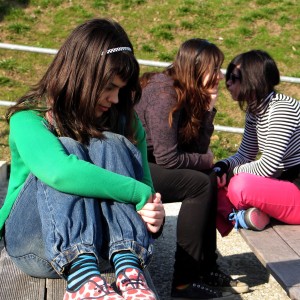 What is peer pressure?
What is peer pressure?
A peer is someone in your own age group that you hang out with. Peer pressure is the feeling that you are being pushed towards making a certain choice, good or bad. Peer pressure might be difficult to avoid, especially for teenagers, because people in general like to “fit in” and be liked by their peer groups. Sometimes you don’t even know that it is happening, or that you are making choices because of peer pressure. Your peers might even use your desire to fit in to make you do things that you don’t want to do.
Examples of Negative peer pressure:
- Doing things you do not want to do.
- Feeling pushed to wear “the right” clothes.
- Missing school.
- Extreme dieting or bodybuilding.
- Teasing, bullying or hurting other people.
- Trying cigarettes, alcohol, or drugs.
Am I prone to peer pressure?
Certain personality traits and factors make a person more likely to give in to pressure. Recognizing these risk factors will help you make the first step in fightin
 In a Healthy Relationship, You have the Right to:
In a Healthy Relationship, You have the Right to:
- Be treated with respect and as an equal
- Express your opinions and feelings
- Not be hurt physically or emotionally
- Have friends and activities outside of the relationship
- To refuse sex or any degree of intimacy at any time
- To end a relationship
Tips for Starting a Healthy Relationship:
- Get to know the person better before starting to date
- Try some group activities before going out alone with the other person
- Explore each other’s interests
- Build a foundation of respect and appreciation
- Be clear with him/her about what you feel comfortable doing
- Encourage the other person to be honest with you
- Let him/her know what time your parents expect you to be home
- Stay safe, let your friends/parents know where you are going and who you are going with
The Importance of Open Communication:
Open communication is the key to a hea
I don’t know what to talk to my parents about.
Parents are most interested in their children’s lives at school or work, but there are many other things that you can use to start a conversation:
- Common interests you share with your parents: sports, music, movies, books, traveling, collections, etc.
- Something you find interesting: a new movie, video game, current event, or story you heard.
- Watch TV together and talk about the shows.
- Ask your parents about their day.
- Help set the table while your parents prepare dinner, ask what else you can do.
Whenever I tell my parents anything, they start asking a lot of questions.
Understand that when your parents ask about your life, they are just interested in your activities and want to show support. It is not their intention to pressure you, and they may not even realize that you find their questions intrusive. If you think that not telling them anything at all is the answer, you are wrong! They may think that you are hiding something and start to set rules that you feel are unreasonable. Not communicating will just make matters worse. Let your parents know how you feel, and be patient and kind when you do this. The more information you offer, the less they need to ask. Talking to them about everyday things also show them that
Is someone you know a victim of dating violence? Are you in an abusive relationship? What can you do to help yourself or your friends? What are your rights in a relationship? Let’s find out.
What is Dating Violence?
Dating violence is a set of abusive behavior that a person shows towards another in a relationship. Violence does not have to be physical; it can be in the form of verbal, emotional, sexual, or financial abuse. Dating violence can happen to people of any race, culture, age, and religious background. It occurs in homosexual as well as heterosexual relationships.
Quick statistics:
Dating violence may be more prevalent than you think:
- 1 in 3 teenagers reported knowing a friend who has been hit by their partner. (2005)
- 62% teenagers said they know friends who have been verbally abused by a boyfriend/girlfriend. (2008)
- 26% girls in a relationship reported experiencing repeated verbal abuse. (2008)
- Nearly 1 in 5 teenage girls who have




